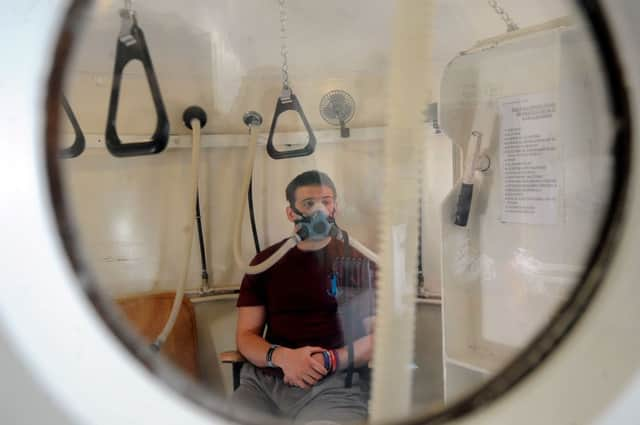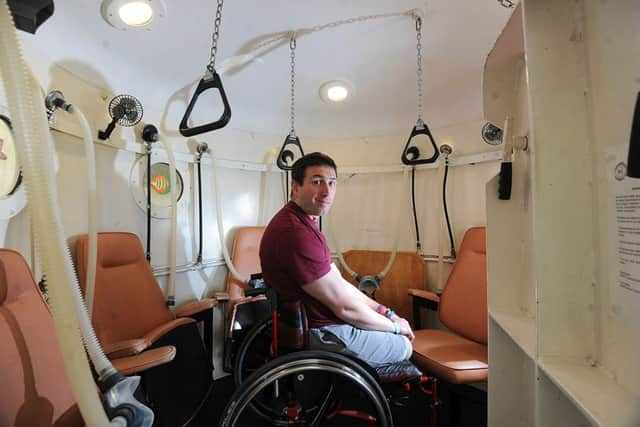Ben Parkinson’s road to recovery, breath by breath


Just a few weeks after undergoing pioneering oxygen treatment and eight years after he was caught in an explosion while serving out in Afghanistan, sustaining injuries which few thought he would recover from, the former paratrooper felt his legs for the first time since he was airlifted to hospital in 2006.
In the days after the Land Rover he was travelling in hit a mine in Helmand Province, doctors told the family to prepare for the worst. Ben had broken every single rib, his spleen was ruptured and with his legs so badly damaged surgeons had no option but to remove both above the knee. Physically he was in a bad way and no one knew what damage had been done to his brain, but as he lay in a coma for four months the prognosis was poor.
Advertisement
Hide AdAdvertisement
Hide AdThat he woke at all defied many early predictions, but even then his family and friends were warned to keep their expectations modest. They were told any recovery he made would be small and whatever progress he had made by the end of two years would be it. Fortunately, Ben was unaware of just how grim doctors believed his future would be. Every year since, his rehabilitation has continued and the last 12 months have seen him make the biggest improvements of all, including learning to walk again.


“I feel stronger than I ever have,” says Ben sat in the lounge of the Multiple Sclerosis Therapy Centre in Rotherham where he is about to undergo another session of oxygen treatment. His speech is still a little slurred, but he can make himself understood and he is unrecognisable from the Ben of even two years ago.
“People who haven’t seen him for a while can’t believe it and to be honest neither can we,” says his stepfather, Andy Dernie. Ben began oxygen treatment at the start of the year and while the initial sessions were carried out at a clinic just outside Edinburgh, he has since been able to continue the treatment closer to his Doncaster home. “We were first offered oxygen treatment in America. We were interested, but it was going to be expensive and so we were a little hesitant. You can never be sure any treatment is going to work, but we were very conscious that we didn’t want to waste money which might be better spent on something else. We started to look around to see if there was anywhere in this country which offered something similar and came across the Castle Craig Hospital.”
The residential rehabilitation clinic uses Hyperbaric Oxygen Treatment (HBOT) to regenerate damaged tissues in the pancreas, liver and brain and other areas affected by alcohol and drug addiction, but with spare capacity it agreed to see whether it would help Ben’s injuries. “The results have been beyond our expectations,” says Andy. “We couldn’t have imagined that there would be so many different changes and that leg twitch was just the start. His speech has improved, it has helped control the infection caused by the use of his prosthetic legs and we believe it is opening up new pathways between the brain and the nerves. His muscles definitely seem to be working differently.”
Advertisement
Hide AdAdvertisement
Hide AdHBOT, which is also used by injured athletes, involves breathing 100 per cent oxygen in a pressurised chamber. The large, white metal contraption that sits in one room of the MS Therapy Centre may not look state of the art, but for Ben and his family it has become something of a second home in the last few weeks. He now has four HBOT sessions a week, with each lasting just over an hour.
“In terms of Ben and the kind of injuries he has, there obviously hasn’t been any clinical trials into how HBOT may help. But we know what we see. It may be that next week or next month he will stop improving and when and if that happens then we will stop, but until then it isn’t doing him any harm and it seems to be doing him an awful lot of good.”
Ben’s mother, Diane Dernie, has worked tirelessly to secure the very best treatment for her son, and she and Andy have become accidental experts in what works in terms of rehabilitation. Alongside physiotherapy, the couple have always been keen to push Ben’s mental recovery. He’s become pretty adept at the brain training sessions downloaded onto his iPad and he also now listens to hours of classical music, which some believe helps improve connections within the brain.
While there have been a legion of people involved in Ben’s recovery, from the Army doctors in Afghanistan to the succession of surgeons, physiotherapists and prosthetic experts who have helped rebuild him, the key has lain within himself.
Advertisement
Hide AdAdvertisement
Hide Ad“The difficulty is not getting Ben to do his physio, it’s getting him to stop. Every morning he does 120 sit-ups and he would continue for the rest of the day if we let him. When we knew that Ben was going to make it, Diane was very clear that she wanted him home as soon as she could, she didn’t want him to become institutionalised in a hospital,” adds Andy.
“She was absolutely right as being back in familiar surroundings with familiar people really helped. Also I think quite crucially we also made sure he stayed in the Army. I think some injured soldiers come out too early and then the support dries up and that’s when they end up slipping through the net. The Army has been very good to Ben, but so it should. It was the Army that got him injured, so it’s right that they should help him get better.”
Ben has no memories of the explosion in which he was injured, but he has retained the fighting spirit that made him such a successful soldier. Having teamed up with the charity Pilgrim Bandits, which was set up by a small group of Special Forces veterans in 2007 with the sole aim of using their unique training and experience to help and inspire wounded soldiers to live life to the full, Ben has completed numerous parachute jumps, kayaked 90 miles up the Gironde River in France and trekked through the Arctic.
“Ben was the kind of person who would talk to anyone and while so much has changed for him, he is still that person. Of course if we could turn the clock black we would all wish that Ben had never been injured, but he was and this is the best way we know how to deal with it. Life will never be what you call normal for Ben, but compared to where he was eight years ago he’s doing pretty good. It’s funny, a little while ago we met up with some of the staff from Selly Oak Hospital where Ben was flown back to. They were in tears, they couldn’t believe how far he had come.”
Advertisement
Hide AdAdvertisement
Hide AdGiven what’s happened in the last few weeks, there may be a few more tears shed. “I want to get better,” says Ben as he puts on the oxygen mask ready for another session. “I am getting better. I want to be Superman.”
• For more information about the Pilgrim Bandits visit www.pilgrimbandits.org